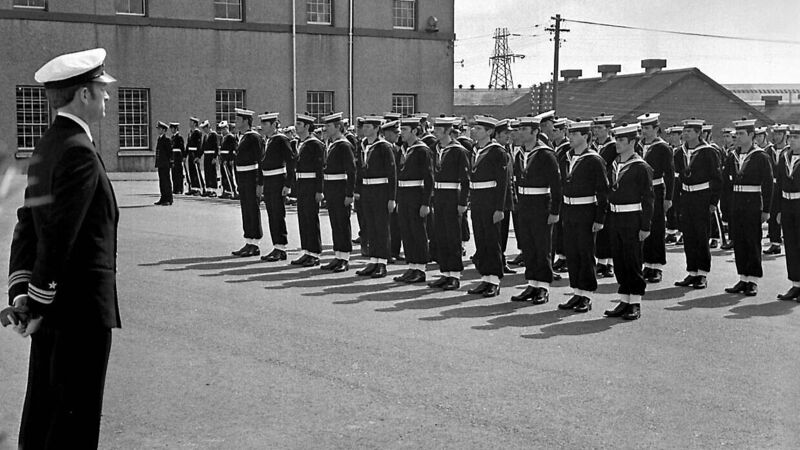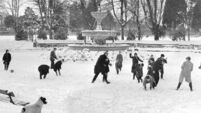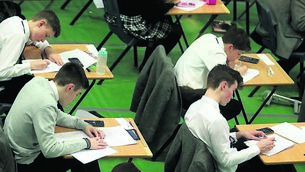Cobh is proud of its naval links but service is suffering decline

‘The Base’, as it’s referred to locally, occupies a prominent position in the harbour. It hard to miss and its presence has been very beneficial to the town, economically and socially.
It’s impossible to walk through Cobh without meeting someone with a connection to the Service.
Some of my own extended family members served as sailors, while others worked as civilians in the naval dockyard attached to the base, with responsibility for maintaining the vessels.
I have relatives who spent a lifetime in the Service and back in the 1980s, I availed of their hospitality on a few occasions when their ships called into Dun Laoghaire in Dublin. I was a young garda stationed a few miles away in Blackrock and was always glad to see a few friendly faces.
The reception the navy got in Cobh wasn’t always hospitable though. There was a time when the relationship between the sailors and Cobhites was fractious to say the least.
In the early 1970s, there were dances in the local CYMS Hall every Friday night. The navy lads were regular attendees, but their presence wasn’t appreciated by everyone.
Some of the local lads saw them as a threat, bringing ‘raiding parties’ into town to steal the women. There was always a bit of tension and it didn’t take much to light the fuse. A scrap could quickly escalate to a melee and it wasn’t unusual for it to spill out from the hall and onto the street.
Nothing too serious, just some bruises, black eyes, and damaged egos on both sides.
The navy lads got a lot of stick. They were accused of never going to sea because they had to be home in time for their dinner. Those of a certain vintage will remember when the LÉ Cliona, LÉ Maeve, and LÉ Macha, made up the Irish Naval fleet and the sentiments of the time were captured in a song written by Luke Kelly of The Dubliners.
We are a seafaring nation
Time has moved on since then and there is a healthy respect for the part the navy has played in peacekeeping missions overseas and in protecting our waters from illegal fishing.
They have also been successful in preventing the importation of illegal drugs. The largest interdiction was probably the seizure of 1,800 kilos of 80%-pure cocaine, valued at €400 million from the yacht Dances With Wolves in 2008, off Mizen Head, Co Cork.
According to Sean O’Riordan, writing in the Irish Examiner, figures show that as of March 1, the total complement of personnel had plunged below the 900 mark, where the minimum manpower level should stand at 1,094.
My son is only 29 years old but he told me that friends of his who had joined the Naval Service after leaving school have already left and are now employed elsewhere. So there is obviously an issue with retaining personnel, which is a pity because it puts a serious dent in the supply of naval characters to Cobh and we don’t want to lose them.
Characters like Noel Fealy, a retired Senior Chief Petty Officer, otherwise known as Sam. He’s originally from Sallynoggin in Dublin and even though he’s lived here for most of his life, he still retains his strong Dublin accent. We’ve adopted him now though and he rattles off yarns faster than any Corkman.
He told me he was called by the Warrant Officer one day to discuss a problem he had. They were due to use Spike Island for their upcoming annual sports day, but the boss man had no athletes. He needed volunteers or the day was going to be a flop.
Sam told him not to worry, he would organise volunteers from the different sections and allocate them to the various disciplines.
The following morning, the sailors lined up for parade and, when it was over, Sam told everyone to stay where they were. He went up and down the line and selected his volunteers.
The tall guys were picked for either the high jump or the long jump while the skinny guys were selected as runners. He told them they were taking part in the annual sports day, much to their surprise.
When Sam was finished, he dismissed the parade and headed back to his office, but as he rounded a corner, he saw a recruit leaning against a door. Sam couldn’t put a name on him, so he asked him who he was.
In a strong Cork accent, he said his name was “Petorrs”. Sam told him, in his best impression of a Cork accent: “Peters, you’re in the hundred metres.”
The bemused man asked him what that was, and Sam held up his arms with his hands three feet apart and told him: “About a hundred of those boy”.







 App?
App?




